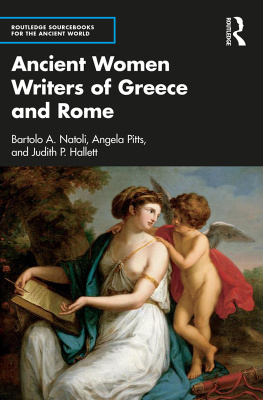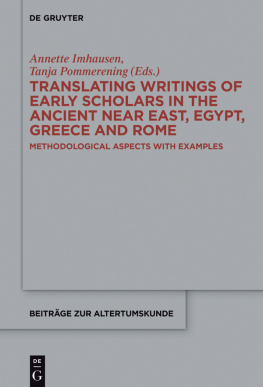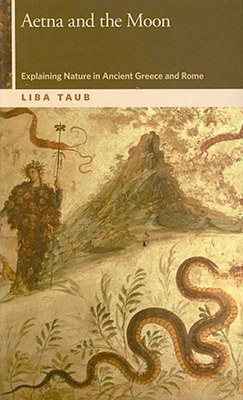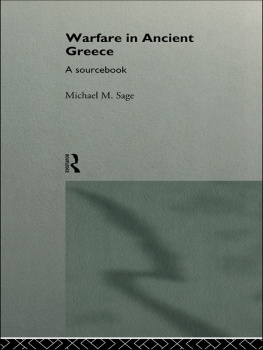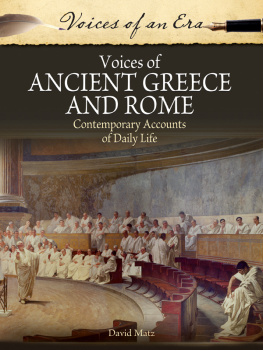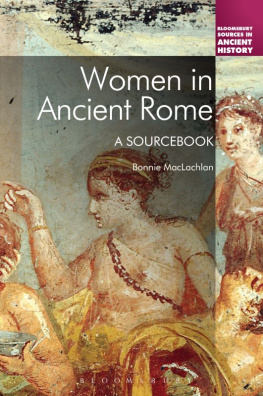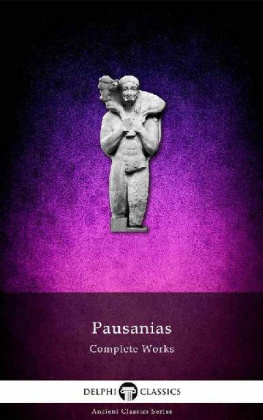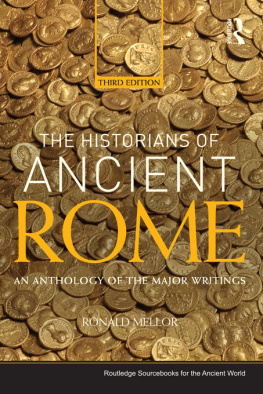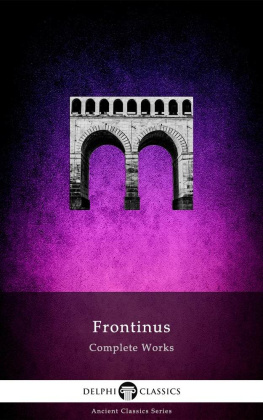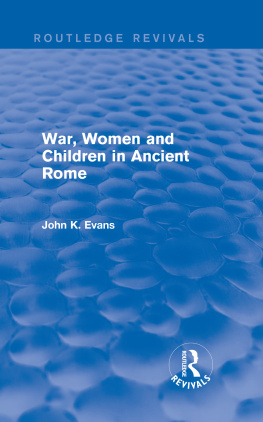Contents

Ancient Women Writers of Greece and Rome
Ancient Women Writers of Greece and Rome features the extant writings of major female authors from the Greco-Roman world, brought together for the first time in a single volume, in both their original languages and translated into English with accompanying commentaries.
The most cost-effective and comprehensive way to study the women writers of Greece and Rome, this book provides original texts, accessible text-commentaries, and detailed English translations of the works of ancient female poets and authors such as Sappho and Sulpicia. It takes a student-focused approach, discussing texts alongside new and original English translations and highlighting the rich, diverse scholarship on ancient women writers to specialists and non-specialists alike. The perspectives of women in the ancient world are still relevant and of interest today, as issues of gender and racial (in)equality remain ever-present in modern society.
Ancient Women Writers of Greece and Rome provides a valuable teaching tool for students of Greek, Latin, and Classical Studies, as well as those interested in ancient literature, history, and gender studies who do not have proficiency in Greek or Latin.
Bartolo A. Natoli is Associate Professor of Classics and Women, Gender, and Sexualities Program Affiliate at Randolph-Macon College. He holds a BA in Latin, Greek, and Secondary Education from the University of Richmond, an MEd in Adult Education and Training from Colorado State University, and a PhD in Classics from the University of Texas at Austin. His recent publications include a monograph entitled Silenced Voices: The Poetics of Speech in Ovid (2017) and an edited volume entitled Teaching Classics with Technology (2019).
Angela Pitts is Professor of Classics at the University of Mary Washington. She received her BA in English and Classics from the University of Ohio and her MA and PhD in Classics from the University of Wisconsin-Madison. Angela has published articles in peer-reviewed journals and volumes on a variety of topics ranging from soundscape in Homers Iliad to Sapphos Nachleben in antiquity.
Judith P. Hallett is Professor of Classics and Distinguished Scholar-Teacher Emerita at the University of Maryland, College Park. She holds a BA in Latin from Wellesley College and an MA and PhD in Classical Philology from Harvard University. She has published widely in the areas of Latin language and literature; women, the family, and sexuality in Greco-Roman antiquity; and the study and reception of classics in the Anglophone world. A former Blegen Visiting Scholar in the Department of Classics at Vassar College and Suzanne Deal Booth Resident Scholar at the Center for Intercollegiate Studies in Rome, Judith has also held fellowships from the Mellon Foundation and the National Endowment for the Humanities. A collection of essays from RoutledgeDomina Illustris: Latin Literature, Gender and Reception (2013), edited by Donald Lateiner, Barbara Gold, and Judith Perkinscelebrates her academic career.
Routledge Sourcebooks for the Ancient World
Recent titles include:
Pompeii and Herculaneum
A Sourcebook, 2nd edition
Alison E. Cooley and M.G.L. Cooley
Ancient Rome
Social and Historical Documents from the Early Republic to the Death of Augustus, 2nd edition
Matthew Dillon and Lynda Garland
Pagans and Christians in Late Antiquity
A Sourcebook, 2nd edition
A.D. Lee
Greek and Roman Technology
A Sourcebook of Translated Greek and Roman Texts, 2nd edition
Andrew N. Sherwood, Milorad Nikolic, John W. Humphrey, and John P. Oleson
Italy Before Rome
A Sourcebook
Katherine McDonald
Sexuality in Greek and Roman Society and Literature
A Sourcebook, 2nd edition
Marguerite Johnson
Ancient Women Writers of Greece and Rome
Bartolo A. Natoli, Angela Pitts, and Judith P. Hallett
For a full list of titles in this series, please visit https://www.routledge.com/Routledge-Sourcebooks-for-the-Ancient-World/book-series/RSAW
Cover Image: The History Collection / Alamy Stock Photo
First published 2022
by Routledge
4 Park Square, Milton Park, Abingdon, Oxon OX14 4RN
and by Routledge
605 Third Avenue, New York, NY 10158
Routledge is an imprint of the Taylor & Francis Group, an informa business
2022 Bartolo A. Natoli, Angela Pitts, and Judith P. Hallett
The right of Bartolo A. Natoli, Angela Pitts, and Judith P. Hallett to be identified as authors of this work has been asserted in accordance with sections 77 and 78 of the Copyright, Designs and Patents Act 1988.
All rights reserved. No part of this book may be reprinted or reproduced or utilised in any form or by any electronic, mechanical, or other means, now known or hereafter invented, including photocopying and recording, or in any information storage or retrieval system, without permission in writing from the publishers.
Trademark notice: Product or corporate names may be trademarks or registered trademarks, and are used only for identification and explanation without intent to infringe.
British Library Cataloguing-in-Publication Data
A catalogue record for this book is available from the British Library
Library of Congress Cataloging-in-Publication Data
A catalog record has been requested for this book
ISBN: 978-0-367-46877-4 (hbk)
ISBN: 978-0-367-46252-9 (pbk)
ISBN: 978-1-003-03172-7 (ebk)
DOI: 10.4324/9781003031727
Typeset in Times New Roman
by KnowledgeWorks Global Ltd.
This volume is humbly dedicated to the memories of Medea Norsa (18771952) and bell hooks (19522021)
List of Figures
Preface and Acknowledgments
This volume has its genesis in a series of conversations with undergraduate students over the past decade. Invariably, each of these conversations unfolded along quite similar lines. They always began in the context of a discussion of ancient literaturesometimes in the original languages, and sometimes in translation. We would ask students about their knowledge of women writers in ancient Greece and Rome, and they would always respond with the same answer: there was Sappho, of course, but no other writers of note from antiquity. When we responded that, in fact, there were numerous female writers and that the works of more than sixty such writers have survived in some fashion, there always was a mixture stunned silence, audible gasps, and unbridled excitement. After having enough of these conversations, we began to inquire as to why students had such little knowledge of these writers. The scholarship on female writers is rich and impressive in every manner; however, it is quite diffuse and oftentimes difficult to access. To examine just the authors discussed in this volume in translation and in the original would require no fewer than a handful of books, a daunting and expensive task for most students.
Therefore, we set out to craft a volume that aims to make these texts and the major works of scholarship on them accessible to all students, whatever their proficiency in ancient languages. This volume gathers together in one place the works of women writers from the Greek and Roman worlds that have come down to us in the most substantial form. Following an introduction by Judith P. Hallett on the survival and later, gendered interpretations of the ancient Greek and Roman womens writings featured in the volume, Angela Pitts and Bartolo A. Natoli present the Greek and Latin texts in both the original and English translation, with notes, running vocabulary and commentary.The running vocabulary provides entries for less familiar words, but all Greek and Latin words from the texts are included in the glossaries at the end of this volume. The texts of each of the authors are introduced with an introduction to the author and the scholarly debates surrounding her writing. Appendices on disputed texts, Greek dialects, and meter complete the volume. It is our hope that this volume can make these important works accessible for both students of Latin and Greek on the secondary through graduate levels and students of the history of literature and of gender and sexuality who have not yet mastered the ancient languages.

